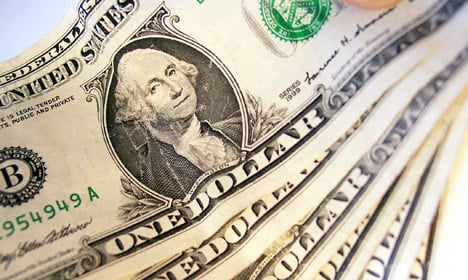FOREX
Danish krone hits 12-year low against the dollar
With the dollar trading at more than seven kroner for the first time in a dozen years, two experts tell The Local how we got here and what it means for Danish businesses and consumers.
Published: 11 March 2015 16:12 CET

Ol' George is doing quite well lately. Photo: Colourbox
The dollar reached a 12-year high against the Danish krone on Wednesday, trading at 7.034 kroner as of 3pm.
According to John Hardy, the head of foreign exchange strategy at Saxo Bank, the dollar’s strong standing is the direct result of the European Central Bank’s (ECB) recently-announced asset purchase programme.
“The ECB is buying up government government bonds to mitigate the risks of inflation and is intentionally driving currencies down,” Hardy told The Local.
With Denmark having fought tooth and nail to defend the krone’s peg to the euro, the ECB’s move is having a “profound effect” on the krone, he said.
Without the euro peg, Hardy said the krone would be “much stronger” against the dollar than it is now.
The euro has also significantly weakened against the dollar and that exchange too hit a 12-year low on Wednesday. As of 3pm, one euro was worth $1.06.
Hardy said that although part of the dollar’s strength can be attributed to speculation that the Federal Reserve will raise its rates, “ECB is the aggressor here”.
But even before the ECB's move, the dollar has been on the rise. Since the beginning of 2015, the dollar has risen 14 percent against the krone, bringing good news for both Danish companies that sell to the US and American tourists on their way to Denmark.
On the flip side, Danes heading to ‘God’s Own Country’ will find that their trip will be nearly 25 percent more expensive than at this time last year, when the exchange rate was at 5.38 kroner.
But Ole Schmidt, an economist with the American Chamber of Commerce in Denmark, cautioned that the effects of the dollar’s strength are not always so straightforward.
“Individual companies will be hit in very different ways, but one thing that is certain is that companies don’t like uncertainty, and any fluctuation in exchange rates creates uncertainty,” Schmidt told The Local.
“That’s exactly why Denmark has tied itself to the euro,” he added.
Schmidt said that although the US is among Denmark’s top five trade partners, it’s not nearly as important to the national economy as Sweden, Germany and the UK.
But a strong dollar affects more than just direct trade with the US.
“Trade with a lot of other countries, including most of Asia, also takes place in dollars and oil is traded in dollars, so the dollar is more important than just Denmark’s exports to the US. A more expensive dollar means that it’s more expensive to import form a lot of places, which is not very advantageous for the Danish economy,” he told The Local.
Schmidt added that although it’s been 12 years since the dollar commanded more than seven kroner, it’s still a far cry from the early 1980s when one dollar could buy more than 12 kroner.
Even so, the dollar’s strength will be felt in Denmark.
“If you’re traveling or doing business across the Atlantic, this will certainly affect you,” he said.
Url copied to clipboard!


 Please whitelist us to continue reading.
Please whitelist us to continue reading.
Member comments